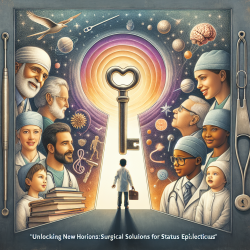Understanding MPAN: A New Perspective
Recent research has unveiled groundbreaking insights into mitochondrial membrane protein-associated neurodegeneration (MPAN), a genetic condition that affects the nervous system. Previously thought to be inherited solely through autosomal recessive patterns, new findings indicate that MPAN can also be inherited in an autosomal dominant fashion. This revelation is crucial for practitioners in speech-language pathology and related fields, as it opens up new avenues for diagnosis and treatment.
The Case Study: A Closer Look
The study, titled A De Novo case of autosomal dominant mitochondrial membrane protein-associated neurodegeneration, presents a case of a 17-year-old Hispanic female who developed progressive muscle weakness and dystonia at the age of 12. Whole-exome sequencing revealed a de novo variant in the C19orf12 gene, which is linked to MPAN. This finding supports the hypothesis that MPAN can result from both autosomal dominant and recessive genetic changes.
Implications for Practitioners
For practitioners, these findings highlight the importance of considering both inheritance patterns when diagnosing and treating MPAN. Here are some actionable steps practitioners can take:
- Stay Informed: Keep abreast of the latest research on genetic neurodegenerative conditions. Understanding the genetic basis of these conditions can aid in early diagnosis and intervention.
- Collaborate with Geneticists: Work closely with geneticists to interpret genetic testing results. This collaboration can provide a comprehensive understanding of a patient's condition and inform treatment plans.
- Personalize Therapy: Use genetic information to tailor therapy approaches. Understanding a patient's genetic profile can help in designing effective interventions that address specific needs.
- Educate Families: Provide families with information about genetic testing and inheritance patterns. Educating families can empower them to make informed decisions about their child's care.
Encouraging Further Research
While this study provides valuable insights, it also underscores the need for further research. Practitioners are encouraged to contribute to this growing body of knowledge by engaging in research and sharing findings with the broader community. Collaboration between clinicians, researchers, and families is essential to advancing our understanding of MPAN and improving outcomes for affected individuals.
Conclusion
The discovery of autosomal dominant inheritance in MPAN is a significant advancement in the field of genetic neurodegenerative disorders. By integrating these findings into practice, speech-language pathologists and other practitioners can enhance their diagnostic and therapeutic approaches, ultimately leading to better outcomes for children with MPAN.
To read the original research paper, please follow this link: A De Novo case of autosomal dominant mitochondrial membrane protein-associated neurodegeneration.










